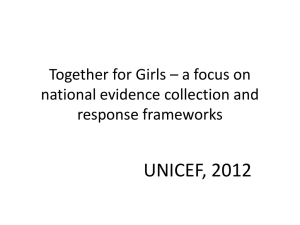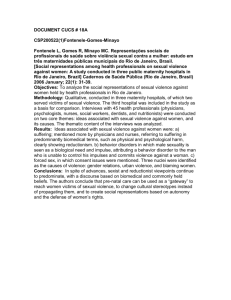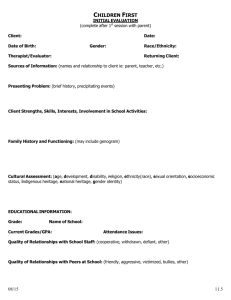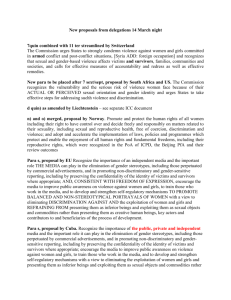Statement by H.E Louise Mushikiwabo, Minister of Foreign Affairs
advertisement
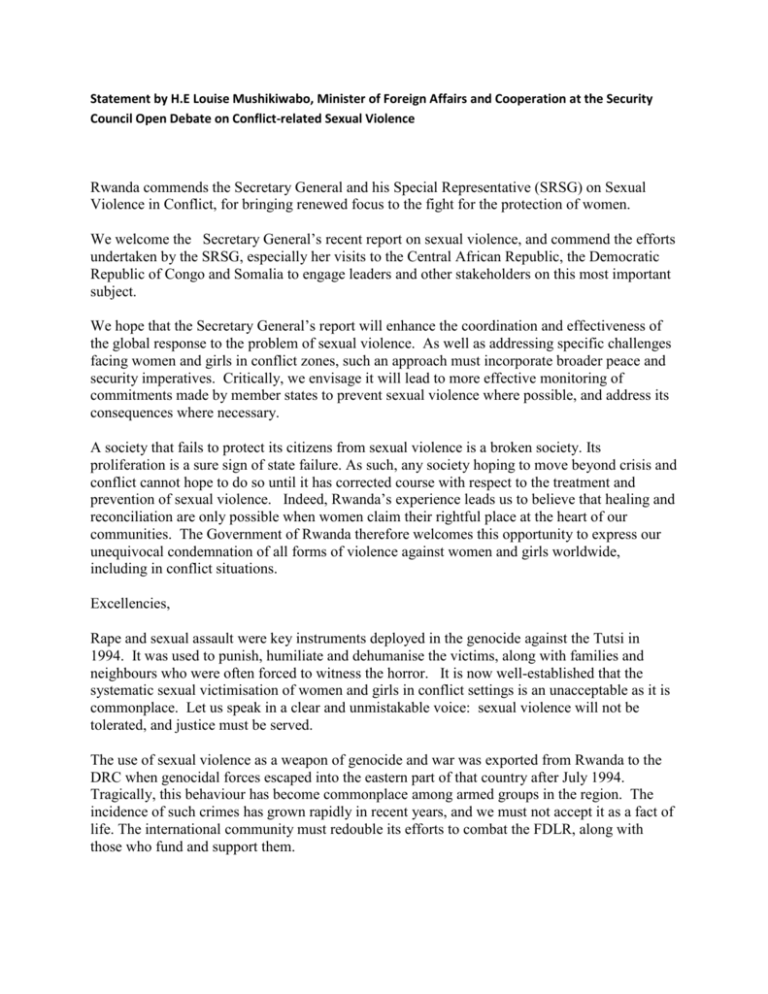
Statement by H.E Louise Mushikiwabo, Minister of Foreign Affairs and Cooperation at the Security Council Open Debate on Conflict-related Sexual Violence Rwanda commends the Secretary General and his Special Representative (SRSG) on Sexual Violence in Conflict, for bringing renewed focus to the fight for the protection of women. We welcome the Secretary General’s recent report on sexual violence, and commend the efforts undertaken by the SRSG, especially her visits to the Central African Republic, the Democratic Republic of Congo and Somalia to engage leaders and other stakeholders on this most important subject. We hope that the Secretary General’s report will enhance the coordination and effectiveness of the global response to the problem of sexual violence. As well as addressing specific challenges facing women and girls in conflict zones, such an approach must incorporate broader peace and security imperatives. Critically, we envisage it will lead to more effective monitoring of commitments made by member states to prevent sexual violence where possible, and address its consequences where necessary. A society that fails to protect its citizens from sexual violence is a broken society. Its proliferation is a sure sign of state failure. As such, any society hoping to move beyond crisis and conflict cannot hope to do so until it has corrected course with respect to the treatment and prevention of sexual violence. Indeed, Rwanda’s experience leads us to believe that healing and reconciliation are only possible when women claim their rightful place at the heart of our communities. The Government of Rwanda therefore welcomes this opportunity to express our unequivocal condemnation of all forms of violence against women and girls worldwide, including in conflict situations. Excellencies, Rape and sexual assault were key instruments deployed in the genocide against the Tutsi in 1994. It was used to punish, humiliate and dehumanise the victims, along with families and neighbours who were often forced to witness the horror. It is now well-established that the systematic sexual victimisation of women and girls in conflict settings is an unacceptable as it is commonplace. Let us speak in a clear and unmistakable voice: sexual violence will not be tolerated, and justice must be served. The use of sexual violence as a weapon of genocide and war was exported from Rwanda to the DRC when genocidal forces escaped into the eastern part of that country after July 1994. Tragically, this behaviour has become commonplace among armed groups in the region. The incidence of such crimes has grown rapidly in recent years, and we must not accept it as a fact of life. The international community must redouble its efforts to combat the FDLR, along with those who fund and support them. Impunity breeds and rewards criminality and violence. Only by insisting on justice and fighting impunity has Rwanda been able to achieve meaningful reconciliation within our borders. The eradication of sexual violence in conflict will not be possible as long as perpetrators are able to escape accountability for their actions. We have come to understand the importance of strengthening internal justice mechanisms and building institutions to enhance accessibility to Justice. Rwanda therefore calls upon all member states to enforce accountability, as well as desist from harboring perpetrators of humanitarian and human rights violations, and thereby shielding them from the consequences of their crimes. Excellencies, Rwanda has adopted a range of policies to prevent and respond to violence against women and girls. These include the establishment of “One Stop Centres”, which offer a wide range of services for the victims of Gender-Based-Violence. These centres bring together relevant government agencies, as well as community leaders and civil society representatives, to provide integrated support for victims. This approach of offering in one place comprehensive medical, psychosocial, evidence-gathering, and judicial services has met with such success in the three year since its establishment that my Government has committed to a significant expansion of the program over the next seven years. In response to the Secretary-General’s Unite to End Violence Against Women and Girls campaign initiated in 2010, Rwanda hosted a high-level International conference on the “role of security organs to end violence against women and girls”. The conference endorsed a declaration and subsequently formed a secretariat to monitor its implementation. With a current membership of sixteen countries and a permanent Secretariat based in Kigali, members have developed a standardised training manual to implement an All Africa Command Post Exercise code named “Africa UNiTE. In addition, Rwanda is the leading contributor from Africa of female police and correctional officers to United Nations peace support and peacekeeping missions. These officers actively contribute to combating, and raising awareness about, violence against women. They also serve as advisors on GBV and share best practices with officers and local authorities. Time would not permit me to outline all the initiatives, however, we will note that Rwanda has adopted in 2010 a national action plan on United Nations Security Council Resolution 1325 and is a party to the 2011 ICGLR Kampala Pact on Sexual and Gender Based Violence. Excellencies, As expressed during Monday’s discussion on the prevention of conflict in Africa, Rwanda takes the firm view that lasting peace and security are only possible when nations, supported by regional and international bodies, address the root causes of conflict, The degradation of women and girls as part of conflict is unacceptable in any form, under any circumstances, and its eradication must be a first-order priority. Rwanda urges all parties to armed conflict to enforce a clear prohibition of sexual violence expressed through chains of command, via Codes of Conduct, military field manuals and in training. We further calls upon those parties to ensure that alleged abuses are investigated swiftly and perpetrators held accountable; Rwanda reminds civilian and military leaders with command responsibilities that they too are accountable for the acts of sexual violence committed on their watch. Rwanda will, on a case by case basis, support the adoption or extension of targeted sanctions against persistent perpetrators of rape and other forms of sexual violence, Rwanda urges the Secretary General as well as the Security Council to bring about greater coordination between UN agencies to prevent and combat all forms of violence against women and girls. We support calls to include provisions in all peacekeeping mandates relating the prevention of, and response to, sexual violence. This should include, where appropriate, the identification of women’s protection advisers (WPAs) alongside gender advisers and human rights protection units. Rwanda recommends that the problem of sexual violence is addressed directly as part of any post-conflict or peace building process. This should include United Nations sponsored peace negotiation agendas, Security Sector reform processes, or as part of Disarmament, Demobilization and Reintegration. Whether through legislative reforms, the training and sensitization of police, prosecutors and judges/magistrates, or the recruitment of more women to such positions, we must insist that national authorities make positive steps towards the protection of women and girls. Due consideration should also be given to the prosecution of sexual violence crimes through transitional justice arrangements. Ladies and gentlemen, I cannot end without calling upon the international community, NGOs, Civil Society, faith based organizations and other non-state actors operating in affected areas to support genuine reporting and investigation of sexual crimes. This is important to ensure justice is served and that survivors are able to begin the process of healing. Above all, we call upon all parties to conflict who are responsible for acts of sexual violence to cease such violations. In conclusion, let me touch briefly on the experience of my country. Rwandan women endured inhuman and degrading atrocities. Many were raped and left for dead. Among those who survived, many were infected with incurable diseases; some were made pregnant; many suffered the humiliation of having been abused in front of their families. And yet, the women of Rwanda refused to be defined or defeated by their ordeals. They raised their heads, declining to become permanent victims or objects of pity. They sought justice. They demanded dignity. Inasmuch as Rwanda has been able to reconcile and recover from the events of 1994, it is because of this unshakeable spirit of defiance, found foremost among its women and girls. I thank you for your kind attention




